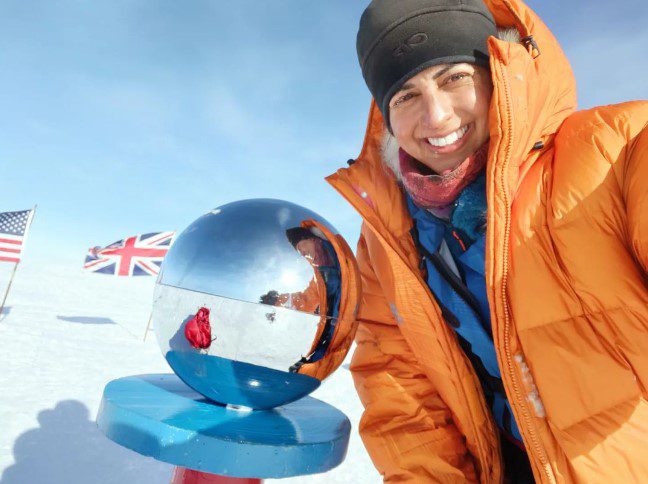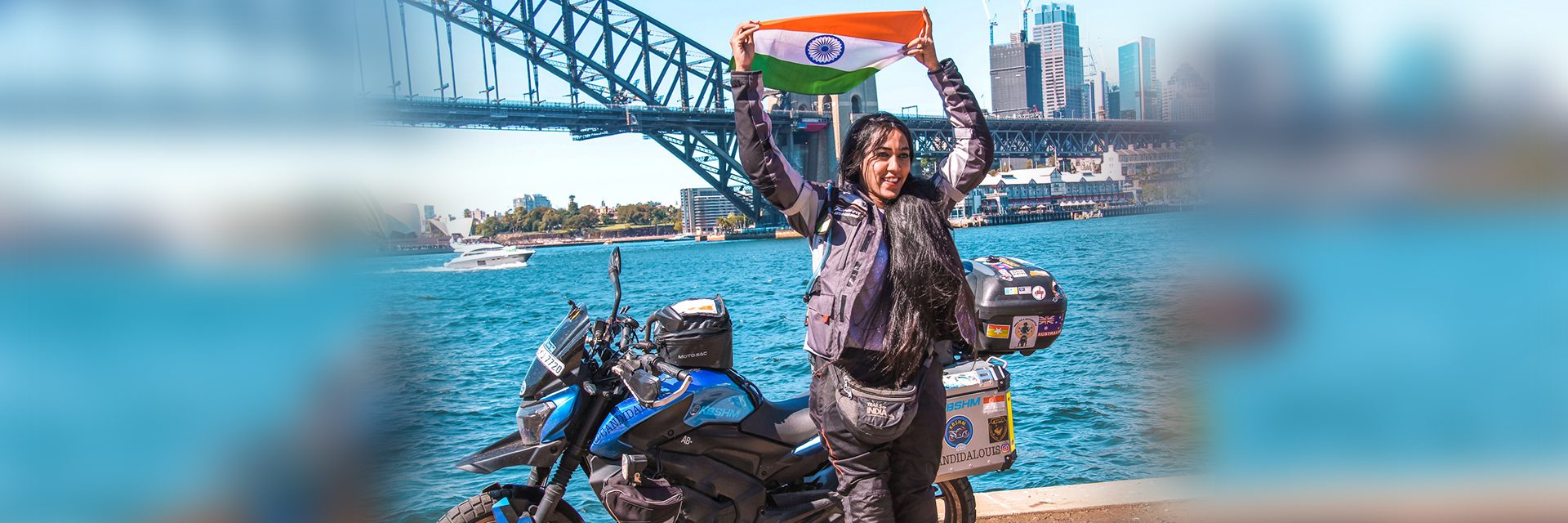(January 18, 2025) British explorer Preet Chandi, widely known as “Polar Preet,” is set to push the boundaries of polar exploration once again as she prepares for a daring solo and unsupported journey to the North Pole. The 36-year-old record-breaker from Derby first made history in January 2022 when she became the first woman of color to complete a solo expedition to the South Pole, covering 702 miles in just 40 days. A year later, she shattered another barrier by skiing 922 miles across Antarctica, enduring -30°C temperatures and 60 mph winds, and breaking the world record for the longest solo unsupported one-way polar ski journey. With four Guinness World Records and accolades from the Princess of Wales, Chandi is now training for her most challenging feat yet—navigating Arctic sea ice, open water, and treacherous conditions with temperatures plunging to -50°C in her bid to become the first woman to travel solo to the North Pole. While acknowledging the slim odds of success, Chandi’s determination reflects her pioneering spirit, making this next expedition a bold step into uncharted territory.

Polar Preet on her skis and dragging her pulk in Antarctica. Photo: Instagram
The Antarctic journey
Setting out at the break of dawn (so to speak, there’s no real nightfall during the Antarctic summer), enduring temperatures as low as -50°C, tackling the formidable sastrugi and battling winds up to 60 mph, Preet Chandi, or Polar Preet, as she calls herself, undertook one of the most arduous journeys in the world – the icy ski route across Antarctica. As she planted her flag, the culmination of a 700-mile, forth day journey to the South Pole, she created history – In January 2022, 33-year-old Preet Chandi, a physiotherapist in the British Army, became the first woman of colour to ski solo across the continent of ice and snow. “I don’t just want to break the glass ceiling, I want to smash it into a thousand pieces,” she wrote on her website. “I was told no on so many occasions, called stubborn or rebellious because I wanted to do things that were out of the norm and push my boundaries. I want to encourage others to push their boundaries, it is amazing how much your world opens up when you start to do so.” In June 2022, the polar trekker was named in the Queen’s Birthday Honours List as a Member of the Order of the British Empire.
The rule-breaker
Born in Derby, England, to an immigrant couple, Preet raised many eyebrows in her conservative Sikh community when she decided to join the army. She did it anyway; she trained in physiotherapy and currently serves as a captain in the Royal Army Medical Corps. She’s a seasoned ultramarathoner and had already finished the Marathon des Sables, the 156-mile race across the Sahara Desert, widely regarded as the toughest (and hottest) foot race on earth. Even so, she considers her mammoth journey across the Antarctic as her greatest feat to date.
The idea to take on the South Pole first cropped up three years prior to the expedition, although she never really considered it at the time. However, completing the Marathon des Sables boosted her morale and nudged her to push the envelope further.
It’s always sunny in Antarctica – and windy too
The austral summer is the best (and the only) time to travel across the Antarctic. Don’t let the term ‘summer’ fool you, as the warmest temperature one encounters is a 10°C, which is near the coast. Over the elevated inland, at an altitude of 9,300 ft, Preet was likely braving temperatures of -30°C. Then, there are the winds – Antarctica also has the distinction of being the windiest continent, known for its deadly katabatic winds. Wind speeds can exceed 100 km/h for days at a time, which carry drifting or blowing snow, making for whiteout conditions with very little visibility.
Preet chose the most traversed route – the 700-mile journey that begins at the Hercules Inlet, on the southwestern section of the Ronne Ice Shelf. The route begins at sea level, along the Antarctic coast but travellers must climb 9,300 feet to the polar plateau.
View this post on Instagram
Even if the austral summer conditions are more tolerable than the winter, when the sea freezes over and the continent effectively doubles in size, movement is still extremely difficult. Matthieu Tordeur, the youngest person to ski across the Antarctic described it as being “like peddling your bicycle in sand.” It’s a precarious situation, when food and drink are limited.
Journey to the end of the earth
For Preet Chandi, the two-and-a-half-year prep period started where most journeys do these days – Google. She began from scratch, poring over stories of polar explorers. She saw them wearing thick, fur-lined jackets and bought herself one. Then, she put herself through intense training six times a week, to build strength and endurance of some of the harshest conditions on earth.
But it was funding that was her primary concern. “I would email 10-15 companies in the evenings after work, trying to get sponsors,” Preet wrote in a social media post, shortly after her return. “Most wouldn’t respond and when they did, they couldn’t commit due to COVID.” In the end, her first big sponsor came on board 10 months before the expedition.
Building strength and endurance
Preet devised a rigorous regimen, working out six days a week to achieve the intense strength training required to navigate soft snow and haul a pulk (a small sled that carried her possessions). On November 24, 2021, when the Twin Otter aircraft dropped Preet off on the subcontinent, her pulk weighed a whopping 87 kg, which included tents made for polar conditions and the foods that are made to last and provide adequate nourishment in such demanding terrain.
As she filled out a form online, Preet Chandi realised she needed to experience Antarctic conditions beforehand and took trips to Iceland and Greenland to practice walking across glaciers and climbing ice walls.
The polar explorer’s diet
“I really wanted a Coke Zero,” Polar Preet confessed to National Geographic after her return. “But to be honest, I really liked some of the dried food. I finished the cheese and salami first, even though they stay frozen out there. You just put them in your mouth and let them melt.” High calorie consumption is an absolute must – it’s a matter of staying alive. Preet was consuming around 5000 calories a day and “burning double that.”
The journey is planned in terms of daily progress and she needed 48 days’ worth of food and equipment. There were obstacles galore, more so because of delays and restrictions caused by the pandemic and the Brexit regulations.

Preet Chandi living in a polar tent. Photos: @polarpreet
A song of ice and snow
By Day 3, the cold was beginning to bite and the harsh winds made their presence felt. “The last thing I want is anything to get blown away by the wind,” she wrote on Instagram. “The tent also takes a little longer to put up and as soon as I’m in the tent it’s time for my admin.” Inside, her chores begin with melting ice for water to drink and cook her food and include her daily check-in-calls as well.
When the visibility was good, Preet Chandi would ski for 90-minute intervals and then take a break. On good weather days, she would ski for up to 11 hours a day, “listening to music for most of the day and just daydreaming.” A week in and the extreme loneliness was being acutely felt.
Around December 14, ‘Polar Preet’ made it to Thiels Corner, her halfway mark. The location had a toilet, a great luxury after a month squatting in holes she dug for herself in the snow. She didn’t allow herself the brief respite, though, “I didn’t want to get used to that little bit of comfort of sitting on a toilet,” she wrote. She did, however, treat herself to salmon pasta.
The latter half of trip brought her up against the sastrugi, as well as uphill terrain and headwind. On Day 30, in whiteout conditions, she wrote, “I had to use my arms to pull the pulk out from the deep Sastrugi areas. They can go a few meters high so when it’s a whiteout and you can’t see you’re stepping very carefully.”

Preet Chandi at The South Pole. Photo: Instagram
Homeward bound
Nine days later, reporting a temperature of -45°C with heavy winds in the morning, Polar Preet announced that she was close to the end of her journey. On January 3, 2022 came her triumphant declaration: “Hello everyone, checking in from day 40. I made it to the South Pole where it’s snowing. Feeling so many emotions right now. I knew nothing about the polar world three years ago and it feels so surreal to finally be here.” Ten days later, she was back in Chile.
Upon her return to her home in the UK, she wrote, “It’s the simple things that you miss while on an expedition. Sitting on a toilet seat, sleeping in a bed, having a coke zero… I’m still learning how capable I am and I hope I can help so many more people realise how capable they are too.”
Did you know?
- Antarctica’s average annual temperature ranges from about 10 °C on the coast to −60 °C at the highest parts of the interior.
- In summer temperatures can exceed 10 degrees celsius near the coast but the elevated inland remains at a bone chilling average of minus thirty degrees celsius.
- In winter, the elevated inland temperature can fall to below minus 80 degrees Celsius. Needless to say, there are no skiiers or ultramarathoners around then.
- Antarctica is the windiest continent on Earth. It is known for Katabatic winds, created by radioactive cooling over the elevated Antarctic ice sheet, which produce very cold, dense air that flows downhill. Wind speeds can go up to 200 km/h.
- Whiteouts are common, even in summer. They are a dangerous optical phenomenon when uniform light conditions make it impossible to distinguish shadows, landmarks or the horizon. They can make navigation difficult and distort perspective.
Want to travel to Antarctica? Here’s how.
Trips range from eight days to over three weeks and you can take a cruise, go hiking, skiing, swim in the polar waters or even take a helicopter ride, depending on your level of daring and your budget. Bear in mind that even the most basic trip doesn’t come cheap but it promises to be the adventure of a lifetime. The journey always involves flying out to Chile or Argentina, where Antarctic expeditions begin. Here are some things you can do:
- Go on a cruise. The majority of Antarctic voyages depart from Ushuaia Port, Argentina, which is a three-and-a-half hour direct flight from Buenos Aires. Most of these voyages pass through the infamous Drake Passage and you may even spot wildlife like the great wandering albatross. If you want to skip the Drake Passage, you can fly out of Punta Arenas in Chile and land directly an an airstrip that’s adjacent to the Antarctic Peninsula and board an expedition ship from there.
- Ski trips: This is not for beginners but those with experience can ski through some of the most untouched, breathtakingly beautiful and advanced ski slopes in the world. Ski Antarctica by Alaska Heliski and Ice Trek specialise in Antarctic cross-country and downhill skiing.
- Hiking: Companies like Epic Antarctica offer hiking expeditions that take you walking over the remote parts of the continent.
- Take a helicopter trip (for a hefty price).
- If you’re feeling truly adventurous, you can take the ‘Polar Plunge’ and jump or cannonball into the icy polar waters.
- Penguin safari: Take a trip to the seldom-visited South Georgia Island and revel in beaches teeming with king penguins and elephant seals. You can also pay tribute to the famous explorer Sir Ernest Shackleton.
Discover more fascinating Stories





